英语语法-特殊句式
- 格式:ppt
- 大小:486.50 KB
- 文档页数:34
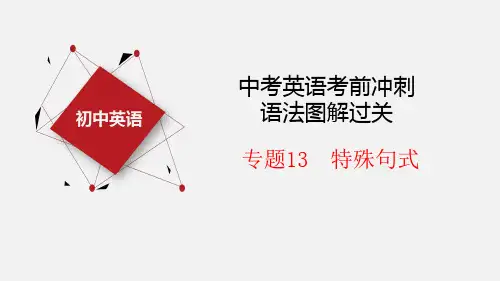
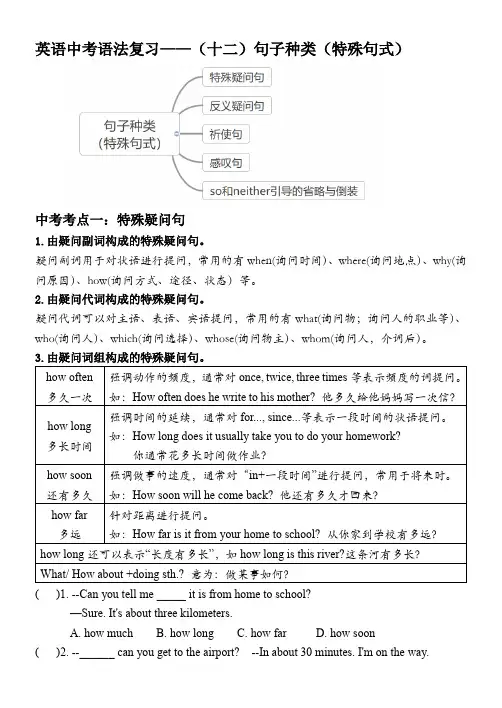
英语中考语法复习——(十二)句子种类(特殊句式)中考考点一:特殊疑问句1.由疑问副词构成的特殊疑问句。
疑问副词用于对状语进行提问,常用的有when(询问时间)、where(询问地点)、why(询问原因)、how(询问方式、途径、状态)等。
2.由疑问代词构成的特殊疑问句。
疑问代词可以对主语、表语、宾语提问,常用的有what(询问物;询问人的职业等)、who(询问人)、which(询问选择)、whose(询问物主)、whom(询问人,介词后)。
how often 多久一次强调动作的频度,通常对once, twice, three times等表示频度的词提问。
如:How often does he write to his mother? 他多久给他妈妈写一次信?how long 多长时间强调时间的延续,通常对for..., since...等表示一段时间的状语提问。
如:How long does it usually take you to do your homework?你通常花多长时间做作业?how soon 还有多久强调做事的速度,通常对“in+一段时间”进行提问,常用于将来时。
如:How soon will he come back? 他还有多久才回来?how far 多远针对距离进行提问。
如:How far is it from your home to school? 从你家到学校有多远?how long还可以表示“长度有多长”,如how long is this river?这条河有多长?What/ How about +doing sth.? 意为:做某事如何?( )1. --Can you tell me _____ it is from home to school?—Sure. It's about three kilometers.A. how muchB. how longC. how farD. how soon( )2. --______ can you get to the airport? --In about 30 minutes. I'm on the way.A. How soonB. How longC. How muchD. How often( )3. --______ have you worked here? —For just one month.A. How oftenB. How longC. How soonD. How much( )4. --We don't have much homework this weekend. Shall we go out together?—OK. What about_______A. to see B seeing C. to see D. sees中考考点二:反义疑问句A. 反义疑问句的标准形式反义疑问句的标准形式是。

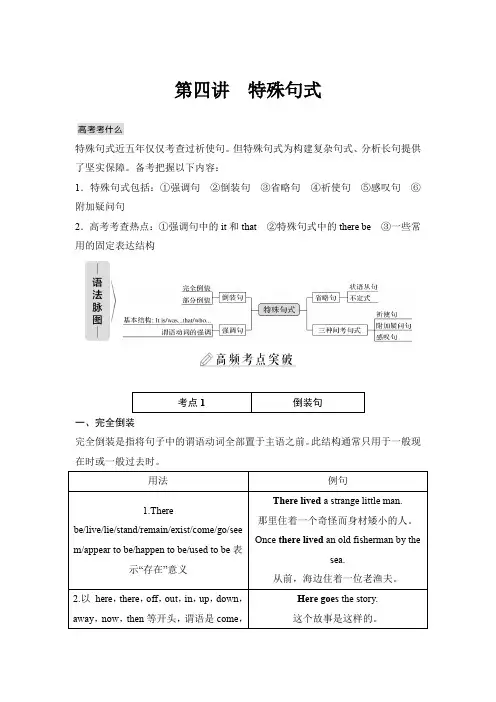
第四讲 特殊句式特殊句式近五年仅仅考查过祈使句。
但特殊句式为构建复杂句式、分析长句提供了坚实保障。
备考把握以下内容:1.特殊句式包括:①强调句 ②倒装句 ③省略句 ④祈使句 ⑤感叹句 ⑥附加疑问句2.高考考查热点:①强调句中的it 和that ②特殊句式中的there be ③一些常用的固定表达结构一、完全倒装完全倒装是指将句子中的谓语动词全部置于主语之前。
此结构通常只用于一般现在时或一般过去时。
二、部分倒装部分倒装是指将谓语的一部分,如助动词或情态动词,置于主语之前。
如果句中的谓语部分不含有助动词或情态动词时,则需添加助动词do, does或did,并将其置于主语之前。
将下列句子变为倒装句①She didn’t have supper until her mother returned.→Not until her mother returned did__she__have__supper.②I hardly think it possible to finish the job before dark.→Hardly do__I__think__it__possible__to__finish__the__job__before__dark.③He learned the sad news only after the war.→Only after the war did__he__learn__the__sad__news.④He speaks English so clearly that he can always make himself understood.→So clearly does__he__speak__English__that__he__can__always__make__himself__understood.强调句型的基本结构单句语法填空/补全句子①It was when I got back to my apartment that I first came across my new neighbors.(天津卷单选改编)②It was only when the car pulled up in front of our house that__we saw Lily in thepassenger seat.(2018·天津卷单选改编)③It__was__not__until__midnight__that the noise of the street stopped.直到午夜,街上的嘈杂声才停止。
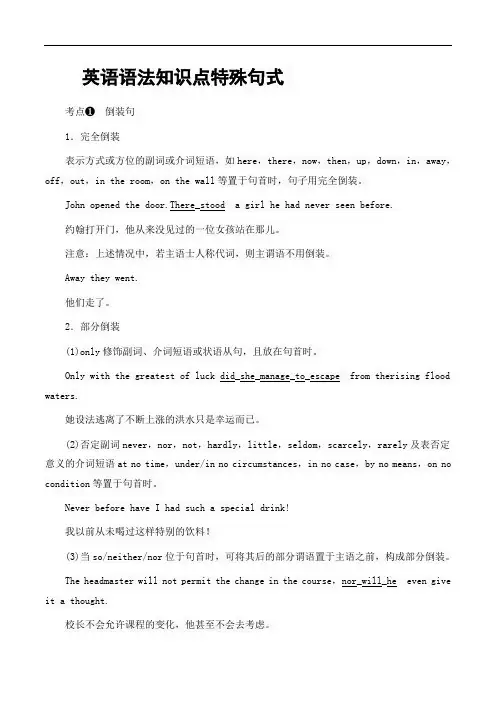
英语语法知识点特殊句式考点❶倒装句1.完全倒装表示方式或方位的副词或介词短语,如here,there,now,then,up,down,in,away,off,out,in the room,on the wall等置于句首时,句子用完全倒装。
约翰打开门,他从来没见过的一位女孩站在那儿。
注意:上述情况中,若主语士人称代词,则主谓语不用倒装。
Away they went.他们走了。
2.部分倒装(1)only修饰副词、介词短语或状语从句,且放在句首时。
waters.她设法逃离了不断上涨的洪水只是幸运而已。
(2)否定副词never,nor,not,hardly,little,seldom,scarcely,rarely及表否定意义的介词短语at no time,under/in no circumstances,in no case,by no means,on no condition等置于句首时。
Never before have I had such a special drink!我以前从未喝过这样特别的饮料!(3)当so/neither/nor位于句首时,可将其后的部分谓语置于主语之前,构成部分倒装。
it a thought.校长不会允许课程的变化,他甚至不会去考虑。
(4)hardly...when...,no sooner...than...,not only...but also...等连接两个句子且hardly,no sooner,not only位于句首时,前一个句子用部分倒装,后一个句子不倒装。
The computer was used in teaching.As a result,not only电脑被应用于教学中。
结果,不仅节省了老师的精力,学生也对课堂更感兴趣了。
(5)在so...that...和such...that...句式中,如果so或such引导的部分位于句首时,他取得了如此大的进步以至于受到了表扬。
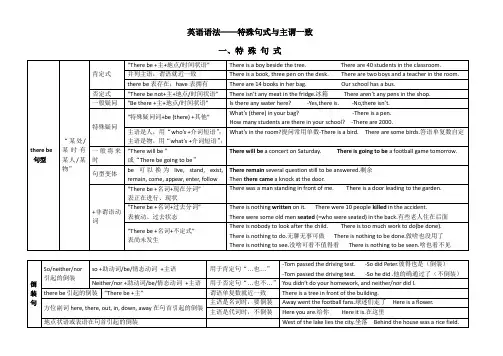
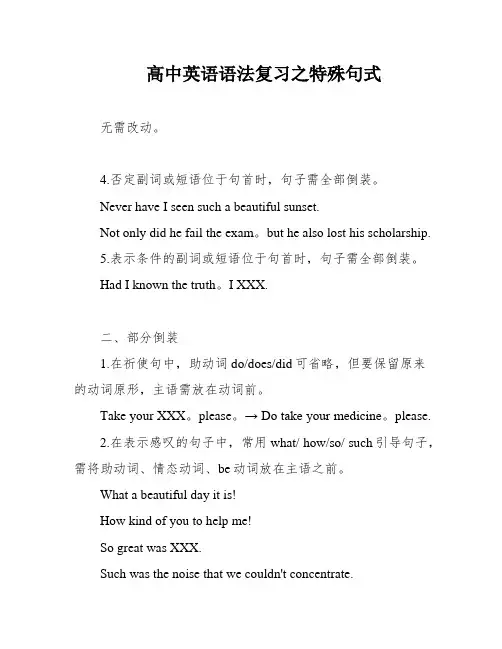
高中英语语法复习之特殊句式无需改动。
4.否定副词或短语位于句首时,句子需全部倒装。
Never have I seen such a beautiful sunset.Not only did he fail the exam。
but he also lost his scholarship.5.表示条件的副词或短语位于句首时,句子需全部倒装。
Had I known the truth。
I XXX.二、部分倒装1.在祈使句中,助动词do/does/did可省略,但要保留原来的动词原形,主语需放在动词前。
Take your XXX。
please。
→ Do take your medicine。
please.2.在表示感叹的句子中,常用what/ how/so/ such引导句子,需将助动词、情态动词、be动词放在主语之前。
What a beautiful day it is!How kind of you to help me!So great was XXX.Such was the noise that we couldn't concentrate.C.强调句强调句是指在句子中通过特殊的语法结构来强调某一成分,使其更加突出。
1.强调句的结构:It is/was + 被强调部分 + that/who + 其他成分。
It was Tom who won the first prize.It XXX.2.强调句中被强调部分的形式:可以是名词、代词、形容词、副词、动词、介词短语等。
It was the best movie I have ever seen.It is only with hard work that you can achieve success.3.强调句的注意事项:强调句中的被强调部分通常放在句首或句末。
强调句中的谓语动词要与其主语保持一致。
强调句中的that/who可以省略,但要注意谓语动词的变化。
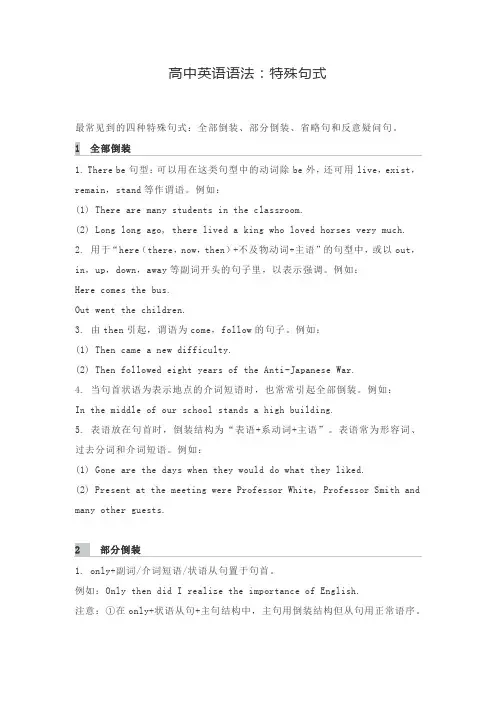
高中英语语法:特殊句式最常见到的四种特殊句式:全部倒装、部分倒装、省略句和反意疑问句。
1 全部倒装1. There be句型:可以用在这类句型中的动词除be外,还可用live,exist,remain,stand等作谓语。
例如:(1) There are many students in the classroom.(2) Long long ago, there lived a king who loved horses very much.2. 用于“here(there,now,then)+不及物动词+主语”的句型中,或以out,in,up,down,away等副词开头的句子里,以表示强调。
例如:Here comes the bus.Out went the children.3. 由then引起,谓语为come,follow的句子。
例如:(1) Then came a new difficulty.(2) Then followed eight years of the Anti-Japanese War.4. 当句首状语为表示地点的介词短语时,也常常引起全部倒装。
例如:In the middle of our school stands a high building.5. 表语放在句首时,倒装结构为“表语+系动词+主语”。
表语常为形容词、过去分词和介词短语。
例如:(1) Gone are the days when they would do what they liked.(2) Present at the meeting were Professor White, Professor Smith and many other guests.2 部分倒装1. only+副词/介词短语/状语从句置于句首。
例如:Only then did I realize the importance of English.注意:①在only+状语从句+主句结构中,主句用倒装结构但从句用正常语序。

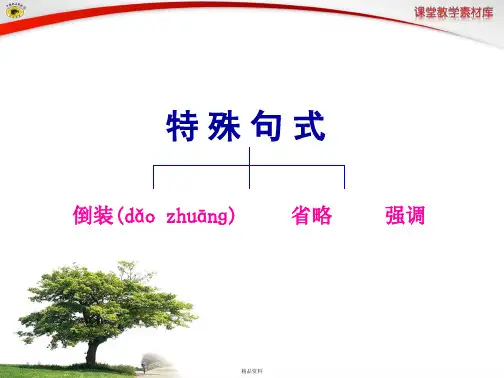
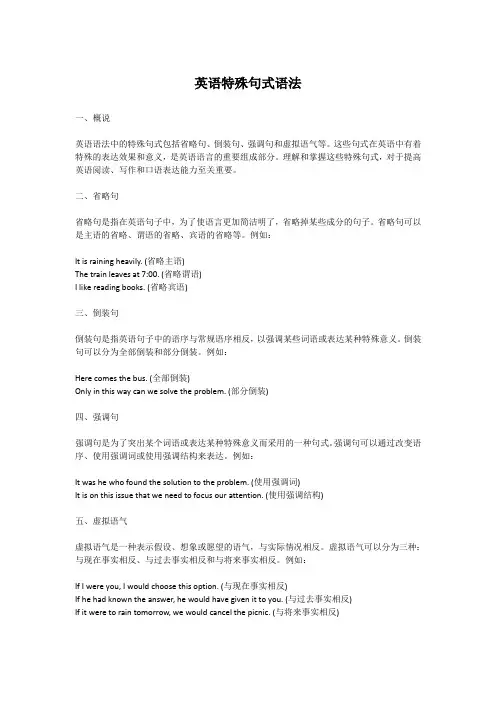
英语特殊句式语法一、概说英语语法中的特殊句式包括省略句、倒装句、强调句和虚拟语气等。
这些句式在英语中有着特殊的表达效果和意义,是英语语言的重要组成部分。
理解和掌握这些特殊句式,对于提高英语阅读、写作和口语表达能力至关重要。
二、省略句省略句是指在英语句子中,为了使语言更加简洁明了,省略掉某些成分的句子。
省略句可以是主语的省略、谓语的省略、宾语的省略等。
例如:It is raining heavily. (省略主语)The train leaves at 7:00. (省略谓语)I like reading books. (省略宾语)三、倒装句倒装句是指英语句子中的语序与常规语序相反,以强调某些词语或表达某种特殊意义。
倒装句可以分为全部倒装和部分倒装。
例如:Here comes the bus. (全部倒装)Only in this way can we solve the problem. (部分倒装)四、强调句强调句是为了突出某个词语或表达某种特殊意义而采用的一种句式。
强调句可以通过改变语序、使用强调词或使用强调结构来表达。
例如:It was he who found the solution to the problem. (使用强调词)It is on this issue that we need to focus our attention. (使用强调结构)五、虚拟语气虚拟语气是一种表示假设、想象或愿望的语气,与实际情况相反。
虚拟语气可以分为三种:与现在事实相反、与过去事实相反和与将来事实相反。
例如:If I were you, I would choose this option. (与现在事实相反)If he had known the answer, he would have given it to you. (与过去事实相反)If it were to rain tomorrow, we would cancel the picnic. (与将来事实相反)六、总结英语特殊句式语法是英语语言的重要组成部分,理解和掌握这些特殊句式对于提高英语阅读、写作和口语表达能力至关重要。
高考英语必备特殊句式大全(附高考英语常用词汇)高考英语必备——特殊句式(一)感叹句一、特殊句式全家福特殊句式这个大的考察方向,近几年,考察不多。
主要涉及到以下的考点。
一、感叹句(语法填空中考察,简单)二、强调结构(语法填空,书面表达中考察,简单)三、倒装句(语法填空,书面表达中考察,中等)四、省略句(基本能力,直接考察不多)五、祈使句(语法填空中考察某些结构)六、反义疑问句(直接考察不多)七、否定句(注意否定转移的现象,直接考察不多)二、感叹句四大结构记牢①What+a/an+adj.+单数可数名词+主语+谓语(系动词)!②What+adj.+复数或不可数名词+主语+谓语(系动词)!③How+adj.+a/an+单数可数名词+主语+谓语(系动词)!④How+adj./adv.+主语+谓语(系动词)!例如:①What a good boy you are!②What good boys they are!③How good a boy you are!④How good you are!此考点看似比较简单,实际上,与从句题放在一起考时,有一定难度。
【例如】①I know ______ good he is.②I know ______ he did isgood.在①中,答案为how,how good he is 是一个how 引导的感叹句;在②中,答案为what,what he did is good 是一个what引导的宾语从句问题来了,如何区分how,what引导的是感叹句还是从句呢?【答案】四个字,句!子!结!构!如宾语或者主语,或者表语;how引导的,其后是一个符合五大基本结构完整的句子。
【经典考察】(1)(2015年新课标卷Ⅱ)As natural architects, the Pueblo Indians figured out exactly ______(70) thick the adobe walls needed to be to make the cycle work on most days.【答案】how;how thick the adobe needed to be符合④How+adj./adv.+主语+谓语(系动词)!结构,故填how;(2)(2021年河南省天一联考)I recently spent a day in Hangzhou to see ______(65) easy it was to go cashless, and I found it somewhat ahead of other cities , including Beijing. I rode buses and subways, which all accept Alipay.【答案】how;how easy it is符合④How+adj./adv.+主语+谓语(系动词)! 结构,故填how;此外,初中的恶人搭配要记牢!how long;how soon;how far;how often;how many;how much【例】how long did he stay here?他在这里呆了多久How long is the river?这条河有多长?How often does he come here?他多久来这里一次?How soon will he be back?他多久之后会回来?How far is it from here to there?从这里到那里有多远。
英语特殊句式语法英语语法中存在一些特殊的句式结构,它们具有独特的语法规则和用法。
在本文中,我们将介绍一些常见的英语特殊句式,并通过示例来解释它们的用法。
一、倒装句倒装句是英语中常见的特殊句式之一,它采取了主语和谓语动词的位置颠倒。
倒装句的用法多种多样,下面是一些常见的情况:1. 完全倒装:当句子以表示地点状态的副词(如here, there, now, then等)开头时,需要完全倒装。
例如:Here comes the bus.There goes my hat.2. 部分倒装:在某些特定的条件下,主语和谓语动词的位置需要部分颠倒。
a. 在用于表示否定的副词或短语(如never, seldom, hardly, not until 等)开头的句子中,需要将助动词或情态动词与主语颠倒。
例如:Never have I seen such a beautiful sunset.Not until she left did I realize how much I loved her.b. 在以表示条件的状语从句(如if, unless, whether等)开头的句子中,需将助动词和主语颠倒。
例如:If only I had more time, I would travel around the world.Whether it rains or not, we will go camping.二、虚拟语气虚拟语气是英语中常见的特殊句式之一,用于表示与事实相反、假设或愿望等情况。
以下是虚拟语气的几种常见形式:1. 虚拟条件句:用于表示与事实相反的假设情况,包括类型1、类型2和类型3三种类型。
a. 类型1:表示真实可能发生的假设例如:If she studies hard, she will pass the exam.b. 类型2:表示与事实相反,但在理论上有可能实现的假设例如:If I were you, I would quit that job.c. 类型3:表示与过去事实相反的假设例如:If I had studied harder, I would have passed the exam.2. 虚拟表达愿望例如:I wish I could play the piano like a professional.3. 虚拟表达建议、命令等例如:The teacher suggested that they should review the material again.三、强调句强调句是一种特殊的句式,它通过强调句子中的某个成分来表达特殊的意义。
英语语法之特殊句式特殊句型特殊句型包括祈使句、感叹句、强调句型、反意疑问句和There be句型。
祈使句祈使句用于表示请求、命令、建议或劝告等。
一般使用降调,为使语气婉转,可使用低升调。
句末使用句号或感叹号。
肯定的祈使句:关上门。
请安静!有时为了加强语气,可以在动词之前加上do,表示“务必,一定”。
一定要按时来。
一定要小心!否定的祈使句:祈使句的否定形式一般是在句首加don’t或never构成。
不要迟到。
做事不可马虎。
其他形式的祈使句:以let开头的祈使句:咱们休息一会。
我们不要大声说话。
以no开始的禁止性祈使句:禁止停车。
禁止吸烟。
祈使句+陈述句句型:在“祈使句+陈述句”这种结构中,祈使句和陈述句之间要用连接词。
连接词分为两类:第一类:and。
then。
and then。
意思是“就”、“那么(就)”、“(刚)才“。
第二类:or。
or else。
otherwise。
意思是“否则”、“要不”、“不然的话”。
使用and和or的方法:选择连接词,只看陈述句。
and叫人心欢畅,or的后果不好尝。
使用第一类连接词和第二类连接词的方法:比较下面三组例句:1)Come early。
and you’ll catch the first bus.早点来,你就能赶上第一班汽车。
Come early。
or you’ll miss the first bus.来早点,不然的话,你就赶不上第一班汽车。
2)Use your head。
then you’ll find a way.开动脑筋,那么你就会找到办法。
Use your head。
or else you won’t find a way.开动脑筋,否则,你就找不到办法。
Work hard。
otherwise you will fail。
This shows that when stating the desired e。
one should use "and"。
特殊句式I There beA 定义表达“某处/某时存在某人/某物”。
B 结构一般结构:There + be + 名词+ 地点将来结构:There will be + 名词+ 地点完成结构:There has been + 名词+ 地点含情态动词结构:There + 情态动词+ be + 名词+地点C 用法a. 就近原则例:There is some juice and some cakes on the table.b. 衍生结构①There be + 名词+ doing(与名词形成主动关系)例:There must be something blocking the pipe.②There be + 名词+ done(与名词形成被动关系)例:T here’s only four days left.③There be + 名词+ to do(未发生,表将要做…)例:There is still a lot of work for me to do.拓展:there be句型中,其结构中谓语动词和非谓语结构的变化·there be中的be有时可用seem to be,happen to be,is likely to be或go,remain,stand,lie,exist,follow,live,come,occur等替换例:There existed different opinions on this problem.·there be结构的非谓语形式:there to be 和there being。
there to be结构可用作动词的宾语,也可用作介词for的宾语;there being可用作除for外的介词宾语或状语例:I expect there to be no argument about this.(作宾语)I have never dreamed of there being a chance to go abroad.(作宾语)There being no enough time left, we have to hurry.(独立主格结构作状语)注:·跟动名词的动词后用there being,常见的有:deny,mind,admit,imagine等·跟不定式的动词后用there to be,常见的动词有:expect,want,hope,wish,like,hate,would like,prefer,mean,intend等c. 固定句型①There is no point/sense (in) doing sth “做某事没意义”例:There is no point/sense arguing further.②There is no doubt that…“毫无疑问…”例:There is no doubt that the new technology is changing the way we work.③There is no need to do sth “没必要做某事“例;There is no need to get up early tomorrow.④There is no possibility/ chance that…“……是不可能的”例:There is no chance that he will change his mind.⑤There is no denying (the fact) that…“不可否认……”例:There is no denying (the fact) that our life has gone from bad to worse.⑥There is no difficulty/ trouble in doing sth“作某事没困难”例:There is no trouble in solving the problem.d. 区分:there be 和have①there be与have都可表示“有”,但在意义上,have表示所有关系,即“拥有”,there be则表示“客观存在”。